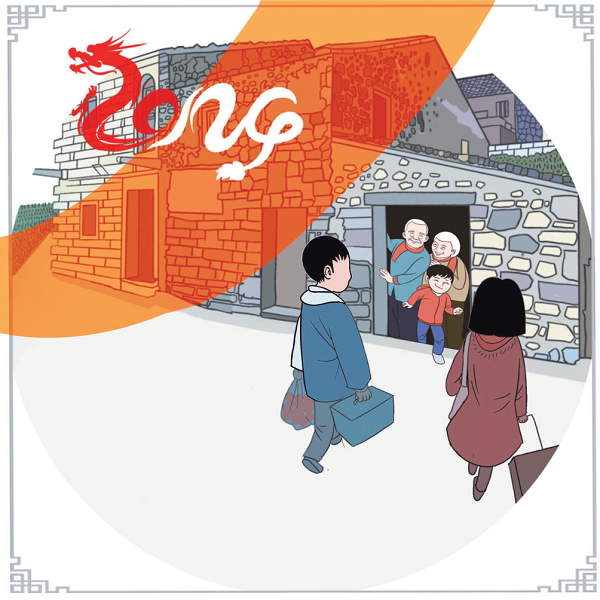Pingtan's distinctive Lunar New Year celebrations
en.ptnet.cn | Updated:2024-01-29 | Lin Kongbo, Stephanie"Sharing the Year" & Customs on the First and Second Days

According to the records in the Pingtan Annals, in the early years, affluent families in Pingtan placed great importance on the tradition of "Fen Nian" (分年), which translates to "sharing the year by offering." In the Pingtan dialect, this tradition involves presenting ten colored gifts, including fish, chicken, duck, red eggs, noodles, pig's feet, and more. When a married daughter returns to her parents' home for the first year, the gifts for the "Fen Nian" ceremony are relatively strict. Typically, five jin of noodles and a pair of pig's feet, among five vegetarian and five meat items, are required, forming the "ten colors."
Historical records indicate that in the early years, daughters from affluent families in Pingtan would return to their parents' home for "Fen Nian," carrying the gifts in ten wooden boxes wrapped in red silk cloth, a custom known as "lifting the boxes." While many Pingtan customs have gradually diminished, the tradition of "Fen Nian" as an expression of filial piety towards parents persists to this day.
The first day of the lunar new year is the beginning of the year, and everyone hopes for a good start. According to the Pingtan Annals, on New Year's Day, there are certain taboos in Pingtan: one should avoid sweeping the floor, fearing that it may sweep away wealth. Nowadays, this custom has evolved into sweeping garbage from the front door inside, and the actual cleaning takes place after the fourth day of the lunar new year; one should avoid using knives to prevent inauspicious events. This taboo aims to prevent accidents and maintain a joyful atmosphere during the festival. Other taboos include refraining from using inauspicious language to avoid conflicts, avoiding scolding children to prevent inauspicious squabbles, and refraining from collecting debts to maintain a harmonious atmosphere on this auspicious day. Additionally, eating congee is discouraged as it is believed to bring rain when leaving the house. Breaking bowls and dishes is also avoided, as in the past, the quality of one's bowl symbolized their status.
On the first day of the lunar new year, people in Pingtan can visit relatives and friends, but on the second day, casual visits are not encouraged.
There is a tradition in Pingtan known as "Bai Xin Zuo" (拜新座), which originated from the end of the forty-first year of the Jiajing reign in the Ming Dynasty. After Qi Jiguang repelled the invading Japanese pirates in Pingtan and Fuqing, those who had fled returned home for the new year. On the morning of the first day, after exchanging congratulations and well wishes, people would visit the homes of those who had lost their lives the previous year to offer condolences. This tradition has continued, and on the second day of the lunar new year in Pingtan, people generally do not visit the homes of relatives and friends.
Lai Min mentioned that in the past, the custom of paying respects on the second day of the lunar new year was known as "Bai Xin Zuo." This practice, conducted on the second day of the lunar new year, involves mutual condolences among neighbors.
After two or three in the morning on that day, the men in the village would wake up early, led by the elders, to pay respects to the homes of those who had lost family members in the past year. The households with recent losses would set up an altar in the ancestral hall, light candles, and wait for neighbors to come and offer condolences. During the visit, individuals would bow to the deceased's spirit, take a sip of the brown sugar ginger tea offered by the host, express words of comfort, and then leave. Thus, paying respects on the second day became a custom that has been passed down to this day. This tradition is unique to Pingtan, Fuqing, and Putian in Fujian province.
"Today, with diversified cultural influences in Pingtan, many younger generations are no longer bound by these customs. Visiting relatives and friends on the second day is quite common. Only the older generation still observes these customs, and within them, the traditional Chinese spirit of honoring ancestors and acknowledging one's roots is embedded," said Lai Min.

 Fujian Public Security Registration Code: 35012802000271
Fujian Public Security Registration Code: 35012802000271